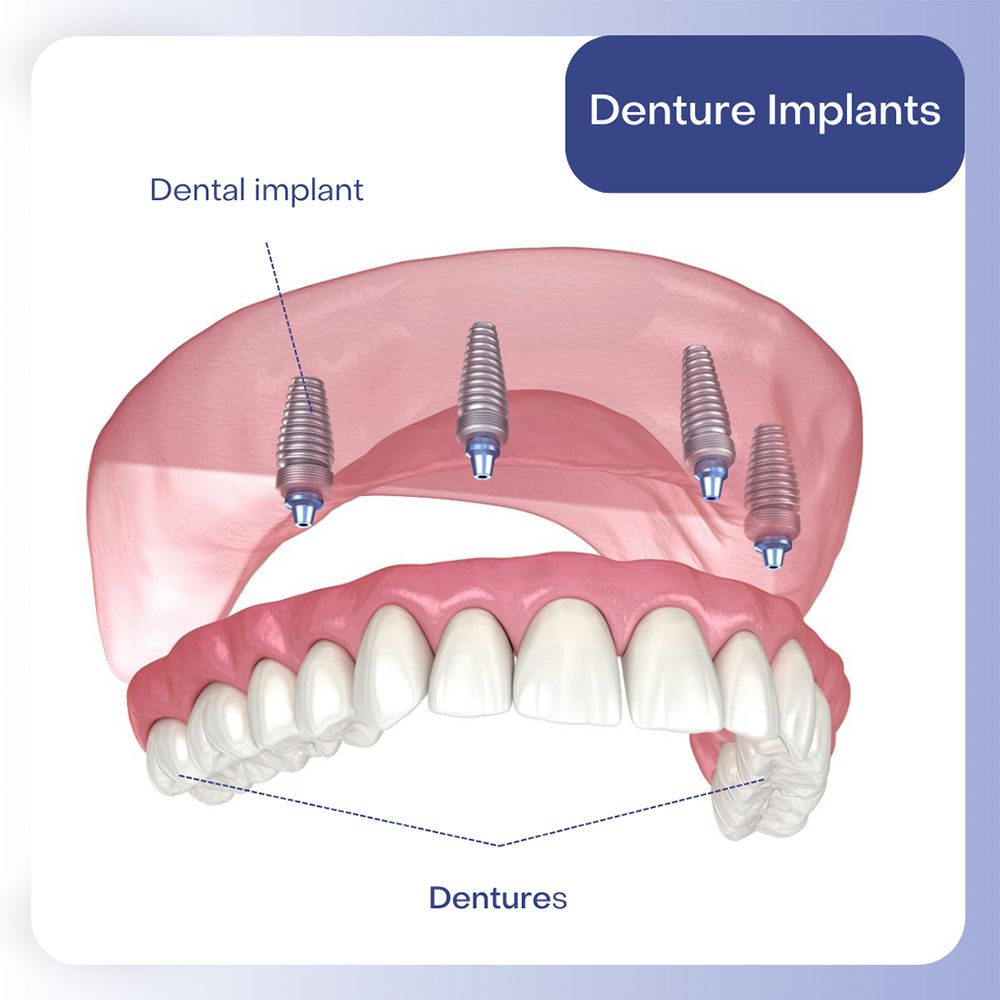Table of contents
Dentures remain a common solution for complete tooth loss in the upper or lower arch but can have drawbacks. Not everyone finds them uncomfortable or easy to wear, especially after several years of use.
Dental implants can provide an alternative treatment, including denture implants. An implant denture can be a good solution for anyone who is unable to have or unsuitable for a fixed implant prosthesis but wishes to get rid of dentures.
 Implant dentures look like conventional dentures, but instead of resting directly on the gums, they are supported by several dental implants. The implants are inserted into the jawbone, providing a strong and stable anchorage point. The implant denture can then fit onto the dental implants. Because it is a removable appliance, it is easily taken out for regular cleaning and maintenance.
Implant dentures look like conventional dentures, but instead of resting directly on the gums, they are supported by several dental implants. The implants are inserted into the jawbone, providing a strong and stable anchorage point. The implant denture can then fit onto the dental implants. Because it is a removable appliance, it is easily taken out for regular cleaning and maintenance.
Denture implants are sometimes called overdentures or implant overdentures. An overdenture can clip onto the dental implants directly. Alternatively, a metal bar can be attached to the implants, and the overdenture fits over the bar.
Anyone struggling to wear a conventional denture or facing complete tooth loss should consider this option. It can be especially good for anyone who has worn dentures for several years and has seen their jawbone resorb significantly.
Jawbone resorption occurs naturally after tooth loss due to the loss of stimulation provided by tooth roots. As the jawbone resorbs, the ridge of bone and gum supporting a full denture diminishes gradually. Consequently, the denture becomes increasingly loose, is more uncomfortable to wear, and can rub painfully on the gums. It becomes trickier to eat properly, and a loose denture can affect speech.
Treatment is very affordable as only a few dental implants are required to support an overdenture.
Read more: Dentures vs Implants
The number of implants required for an overdenture depends on whether you wish to replace an upper or lower arch of teeth.
A lower implant denture may be held in place with as few as two or more likely all-on-four dental implants. We can provide you with a more precise estimate after examining your mouth.
Usually, overdentures are used to restore lower arches of teeth. Lower dentures are more problematic as they rely solely on the bony ridge that originally held your natural teeth for support and retention. Upper dentures cover the upper palate, so they have greater suction.
Overdentures are less suitable for restoring an upper arch of teeth because the upper jawbone tends to be thinner and more fragile. As a result, an overdenture needs more dental implants to hold it in place, sometimes as many as six. The treatment process is also more complex because the sinus cavities, air-filled spaces above the upper back teeth, must be avoided.
If you wish to replace an upper full denture with an overdenture, we can discuss this option with you, but it may not be the best treatment. Otherwise, there will be other solutions to explore.
There are two stages to planning implant overdenture treatment outlined below.
You will need an initial consultation with our implant dentist at My New Jersey Dentist. We must also take diagnostic tests that include a cone beam CT scan and digital dental x-rays.
Diagnostic tests allow us to plan your implant surgery behind the scenes, so placing the dental implants is a simple, smooth, and more comfortable procedure. The CT scan provides 3-D images of your jaws and any existing teeth and is particularly important, allowing us to evaluate your jawbone health.
We can use these images to determine if there is enough healthy bone in the areas where the implants need to be situated. Each implant location is pre-identified during this process and checked to ensure it does not affect any nerves, blood vessels, or sinus cavities if the implants are placed in the upper jaw.
Once the treatment plan is complete, we make a computer-generated surgical stent. The stent or template fits over your gums during surgery and guides our implant dentist, ensuring your treatment plan is replicated precisely.
Generally, the implants are inserted towards the front of the jaw. Usually, the need for bone grafting is reduced because the bone is naturally stronger and thicker in this area. The implants are situated in the jawbone in such a way as to increase contact between the implant post and the bone. The increased contact helps provide additional stability and strength to support the implant overdenture properly.
Not surprisingly, most people worry they will be left without teeth. However, it’s often possible to fit and overdenture soon after surgery. Fitting the overdenture soon afterward helps splint the implants together during healing, preventing them from moving. They must remain undisturbed during healing or Osseointegration to fuse properly with your jawbone.
If you have an existing full denture in good condition, we might be able to adapt this by changing the fitting surface to accommodate the implant attachments that will clip onto your dental implants. Otherwise, we can make and fit another overdenture or a temporary restoration for you to use.
Some minor discomfort as the anesthetic wears off is perfectly normal. Over-the-counter painkillers may be adequate to control it. If required, we can prescribe stronger pain relief. You may be prescribed antibiotics and need an antimicrobial mouthwash to help prevent teeth infection during healing. We can show you how to keep your implants and overdenture clean.
While your implants heal, it’s important not to place them under too much pressure, so you must adapt your diet. Choosing soft foods that require no or minimal chewing will protect your implants during healing. We can discuss which foods to choose so you can stock up before your surgery.
A fixed prosthesis, such as an implant bridge permanently fitted in the mouth, is often considered the best treatment. However, an implant overdenture is an excellent solution that may be preferable to a fixed prosthesis in some circumstances. An overdenture costs less than a fixed implant bridge and can be easier to maintain.
Patients who choose this treatment enjoy the increased biting strength of an overdenture compared to a full denture. They find the removable overdenture easy to care for. Knowing the implant denture will remain firmly in place helps improve self-confidence and self-esteem.
Visiting our dental clinic will allow you to explore all potential implant solutions more fully and discover if an overdenture is the right choice.

My name is Victoria Kushensky. I am a general dentist dedicated to remaining at the forefront of my field. Combining compassionate care with extensive knowledge, I offer cosmetic and general dentistry services as well as advanced root canal treatments.
I earned my Doctor of Dental Surgery (DDS) degree from the esteemed New York University College of Dentistry. Throughout my career, I have honed my skills in various dental procedures, ensuring effective treatment for each patient’s unique needs. I prioritize patient comfort and understanding, taking the time to thoroughly explain procedures and address any questions.
More about Dr. KushenskyMy NJ Dentist: Victoria Kushensky, DDS
385 Prospect Ave Suite 304
Hackensack, NJ 07601
(201) 298-8000